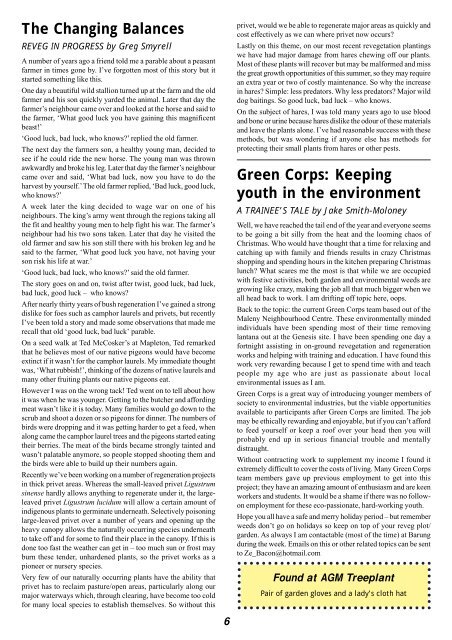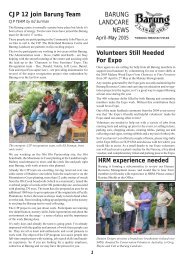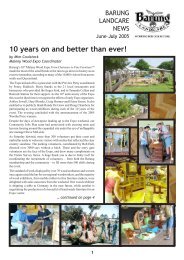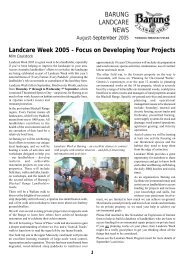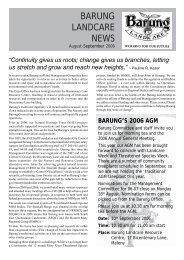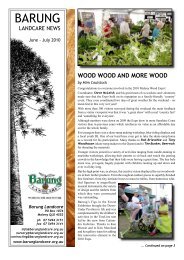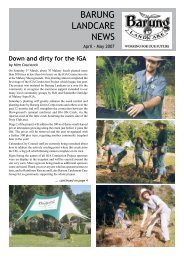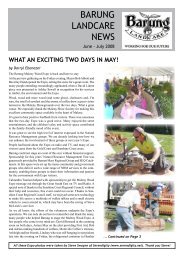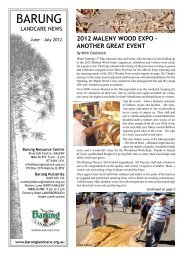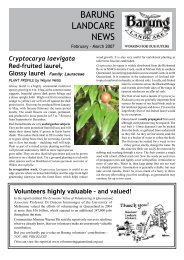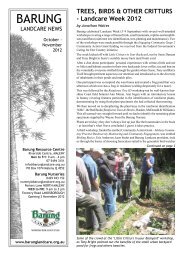Create successful ePaper yourself
Turn your PDF publications into a flip-book with our unique Google optimized e-Paper software.
The Changing Balances<br />
REVEG IN PROGRESS by Greg Smyrell<br />
A number of years ago a friend told me a parable about a peasant<br />
farmer in times gone by. I’ve forgotten most of this story but it<br />
started something like this.<br />
One day a beautiful wild stallion turned up <strong>at</strong> the farm and the old<br />
farmer and his son quickly yarded the animal. L<strong>at</strong>er th<strong>at</strong> day the<br />
farmer’s neighbour came over and looked <strong>at</strong> the horse and said to<br />
the farmer, ‘Wh<strong>at</strong> good luck you have gaining this magnificent<br />
beast!’<br />
‘Good luck, bad luck, who knows?’ replied the old farmer.<br />
The next day the farmers son, a healthy young man, decided to<br />
see if he could ride the new horse. The young man was thrown<br />
awkwardly and broke his leg. L<strong>at</strong>er th<strong>at</strong> day the farmer’s neighbour<br />
came over and said, ‘Wh<strong>at</strong> bad luck, now you have to do the<br />
harvest by yourself.’ The old farmer replied, ‘Bad luck, good luck,<br />
who knows?’<br />
A week l<strong>at</strong>er the king decided to wage war on one of his<br />
neighbours. The king’s army went through the regions taking all<br />
the fit and healthy young men to help fight his war. The farmer’s<br />
neighbour had his two sons taken. L<strong>at</strong>er th<strong>at</strong> day he visited the<br />
old farmer and saw his son still there with his broken leg and he<br />
said to the farmer, ‘Wh<strong>at</strong> good luck you have, not having your<br />
son risk his life <strong>at</strong> war.’<br />
‘Good luck, bad luck, who knows?’ said the old farmer.<br />
The story goes on and on, twist after twist, good luck, bad luck,<br />
bad luck, good luck – who knows?<br />
After nearly thirty years of bush regener<strong>at</strong>ion I’ve gained a strong<br />
dislike for foes such as camphor laurels and privets, but recently<br />
I’ve been told a story and made some observ<strong>at</strong>ions th<strong>at</strong> made me<br />
recall th<strong>at</strong> old ‘good luck, bad luck’ parable.<br />
On a seed walk <strong>at</strong> Ted McCosker’s <strong>at</strong> Mapleton, Ted remarked<br />
th<strong>at</strong> he believes most of our n<strong>at</strong>ive pigeons would have become<br />
extinct if it wasn’t for the camphor laurels. My immedi<strong>at</strong>e thought<br />
was, ‘Wh<strong>at</strong> rubbish!’, thinking of the dozens of n<strong>at</strong>ive laurels and<br />
many other fruiting plants our n<strong>at</strong>ive pigeons e<strong>at</strong>.<br />
However I was on the wrong tack! Ted went on to tell about how<br />
it was when he was younger. Getting to the butcher and affording<br />
me<strong>at</strong> wasn’t like it is today. Many families would go down to the<br />
scrub and shoot a dozen or so pigeons for dinner. The numbers of<br />
birds were dropping and it was getting harder to get a feed, when<br />
along came the camphor laurel trees and the pigeons started e<strong>at</strong>ing<br />
their berries. The me<strong>at</strong> of the birds became strongly tainted and<br />
wasn’t pal<strong>at</strong>able anymore, so people stopped shooting them and<br />
the birds were able to build up their numbers again.<br />
Recently we’ve been working on a number of regener<strong>at</strong>ion projects<br />
in thick privet areas. Whereas the small-leaved privet Ligustrum<br />
sinense hardly allows anything to regener<strong>at</strong>e under it, the largeleaved<br />
privet Ligustrum lucidum will allow a certain amount of<br />
indigenous plants to germin<strong>at</strong>e underne<strong>at</strong>h. Selectively poisoning<br />
large-leaved privet over a number of years and opening up the<br />
heavy canopy allows the n<strong>at</strong>urally occurring species underne<strong>at</strong>h<br />
to take off and for some to find their place in the canopy. If this is<br />
done too fast the we<strong>at</strong>her can get in – too much sun or frost may<br />
burn these tender, unhardened plants, so the privet works as a<br />
pioneer or nursery species.<br />
Very few of our n<strong>at</strong>urally occurring plants have the ability th<strong>at</strong><br />
privet has to reclaim pasture/open areas, particularly along our<br />
major w<strong>at</strong>erways which, through clearing, have become too cold<br />
for many local species to establish themselves. So without this<br />
6<br />
privet, would we be able to regener<strong>at</strong>e major areas as quickly and<br />
cost effectively as we can where privet now occurs?<br />
Lastly on this theme, on our most recent reveget<strong>at</strong>ion plantings<br />
we have had major damage from hares chewing off our plants.<br />
Most of these plants will recover but may be malformed and miss<br />
the gre<strong>at</strong> growth opportunities of this summer, so they may require<br />
an extra year or two of costly maintenance. So why the increase<br />
in hares? Simple: less pred<strong>at</strong>ors. Why less pred<strong>at</strong>ors? Major wild<br />
dog baitings. So good luck, bad luck – who knows.<br />
On the subject of hares, I was told many years ago to use blood<br />
and bone or urine because hares dislike the odour of these m<strong>at</strong>erials<br />
and leave the plants alone. I’ve had reasonable success with these<br />
methods, but was wondering if anyone else has methods for<br />
protecting their small plants from hares or other pests.<br />
Green Corps: Keeping<br />
youth in the environment<br />
A TRAINEE’S TALE by Jake Smith-Moloney<br />
Well, we have reached the tail end of the year and everyone seems<br />
to be going a bit silly from the he<strong>at</strong> and the looming chaos of<br />
Christmas. Who would have thought th<strong>at</strong> a time for relaxing and<br />
c<strong>at</strong>ching up with family and friends results in crazy Christmas<br />
shopping and spending hours in the kitchen preparing Christmas<br />
lunch? Wh<strong>at</strong> scares me the most is th<strong>at</strong> while we are occupied<br />
with festive activities, both garden and environmental weeds are<br />
growing like crazy, making the job all th<strong>at</strong> much bigger when we<br />
all head back to work. I am drifting off topic here, oops.<br />
Back to the topic: the current Green Corps team based out of the<br />
Maleny Neighbourhood Centre. These environmentally minded<br />
individuals have been spending most of their time removing<br />
lantana out <strong>at</strong> the Genesis site. I have been spending one day a<br />
fortnight assisting in on-ground reveget<strong>at</strong>ion and regener<strong>at</strong>ion<br />
works and helping with training and educ<strong>at</strong>ion. I have found this<br />
work very rewarding because I get to spend time with and teach<br />
people my age who are just as passion<strong>at</strong>e about local<br />
environmental issues as I am.<br />
Green Corps is a gre<strong>at</strong> way of introducing younger members of<br />
society to environmental industries, but the viable opportunities<br />
available to participants after Green Corps are limited. The job<br />
may be ethically rewarding and enjoyable, but if you can’t afford<br />
to feed yourself or keep a roof over your head then you will<br />
probably end up in serious financial trouble and mentally<br />
distraught.<br />
Without contracting work to supplement my income I found it<br />
extremely difficult to cover the costs of living. Many Green Corps<br />
team members gave up previous employment to get into this<br />
project; they have an amazing amount of enthusiasm and are keen<br />
workers and students. It would be a shame if there was no followon<br />
employment for these eco-passion<strong>at</strong>e, hard-working youth.<br />
Hope you all have a safe and merry holiday period – but remember<br />
weeds don’t go on holidays so keep on top of your reveg plot/<br />
garden. As always I am contactable (most of the time) <strong>at</strong> <strong>Barung</strong><br />
during the week. Emails on this or other rel<strong>at</strong>ed topics can be sent<br />
to Ze_Bacon@hotmail.com<br />
Found <strong>at</strong> AGM Treeplant<br />
Pair of garden gloves and a lady’s cloth h<strong>at</strong>


